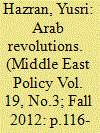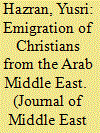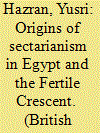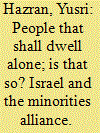|
|
|
Sort Order |
|
|
|
Items / Page
|
|
|
|
|
|
|
| Srl | Item |
| 1 |
ID:
121502


|
|
|
| 2 |
ID:
168851


|
|
|
|
|
| Summary/Abstract |
Since the late 1950s, Christians’ emigration from the Arab Middle East has been a basic phenomenon affecting the political and social landscape of the region as well as a fundamental dynamic behind the depression of its Christian demography. This article shows that the intensive departure has been the result of structural and historical factors related to the performance of the modern Arab nation-states in the post-colonial era. Instead of the generalized and simplistic explanations that are often advanced that link the Christians’ emigration to Islamic revivals, the main dynamic of this out migration instead can be found in the policies of the modern Arab state and the outbreak of communal and regional conflicts.
|
|
|
|
|
|
|
|
|
|
|
|
|
|
|
|
| 3 |
ID:
163456


|
|
|
|
|
| Summary/Abstract |
This paper differs from previous studies in arguing that sectarianism has overwhelmingly been created consensually by/or as a result of the elites’ behavioral patterns. Religious or communal pluralism does not categorically lead to political sectarianism; The development of pluralism into political sectarianism can thus be adduced as dependent upon other factors—first and foremost the behavioural patterns of the elite. While the imperial legacy, theological controversies, and socio-economic gaps feed political sectarianism, in and of themselves they are insufficient to cause it. A survey of the history of Egypt and the other countries in the Fertile Crescent reveals that the development of political sectarianism or sectarian violence has been organically linked to elites' political behaviors and interests. sectarianism takes the form of the instrumental exploitation of a religious or communal identity or framework in order to enable political organization, the gaining of political legitimacy, the promotion of political change, or the preservation of the control held by interest groups. While in the eyes of many critics, sectarianism forms a striking example of the elites' intrinsic weakness, sectarianism is first and foremost a product of the elites’ quest for power.
|
|
|
|
|
|
|
|
|
|
|
|
|
|
|
|
| 4 |
ID:
174160


|
|
|
|
|
| Summary/Abstract |
The state of Israel, and the Zionist movement before it, has always considered itself to be facing an existential threat from hostile surroundings. Hence, seeking alliance with non-Arab nations and ethnic minority groups in the area was seen as a means of confronting this challenge. During the early decades of its existence, the Israeli establishment adopted the concept of the alliance of the periphery and the alliance of minorities developed by Israel’s first prime minister, David Ben-Gurion and his protégée, Reuven Shiloah, the founder of the Israeli intelligence service, the Mossad. This research project will demonstrate that, in opposition to apologetic and ideologically-motivated arguments that deny that alliance with minority communities has been a systematic policy, the minorities’ alliance has for decades been an important foundation of Israeli strategy vis-à-vis the Arab world. Furthermore, the article will argue and demonstrate that the ‘Minorities Alliance’ is derived from ideological, historical, and strategic considerations anchored in the very existence of Zionism and Israel. Furthermore, and on the same note, this conception and strategy cannot be disconnected from the self-perception of Zionism, its self-directed reading of Jewish history, and the Zionisation of the milieu.
|
|
|
|
|
|
|
|
|
|
|
|
|
|
|
|
| 5 |
ID:
100586


|
|
|
|
|
| Publication |
2010.
|
| Summary/Abstract |
The historical development, which might be called the "crystallization" of politicized Shi'ite religiosity, constitutes one of the major reasons behind the current crisis of the territorial state in Iraq and Lebanon. Having dominated Shi'ite political life since the 1970s, this phenomenon derived from a combination of various processes, primarily related to the territorial state and its political and ideological mechanisms. These processes established primordial local attachments as the principal tool for political change and empowerment.
|
|
|
|
|
|
|
|
|
|
|
|
|
|
|
|
|
|
|
|
|